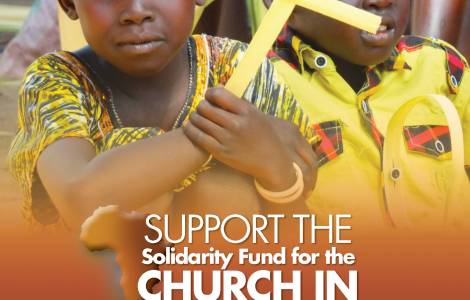
Washington (Agenzia Fides) - "Africa faces the economic and social hurdles of enormous debt, epidemic, severe poverty, and political unrest. In spite of these challenges, the Church in Africa has almost tripled in size in the past 30 years. However, it is difficult for the Church to sustain its growth and maintain essential pastoral outreach", affirms the US Episcopal Conference in presenting the Solidarity Fund for the Church in Africa.
This is an initiative "founded on the basic principles of Saint John Paul II's call to action in Ecclesia in Africa and the adoption of the statement "A Call to Solidarity with Africa".
The Fund provides grants to finance pastoral projects including outreach programs, schools, evangelization, and education of clergy and lay ministers. Our solidarity is necessary to help the "salt of the Earth" Church in Africa realize its potential as a "light of the world", says the statement sent to Agenzia Fides.
Through a grant from the Solidarity Fund for the Church in Africa (SFCA), the Naomi Center in Kisantu can provide more vocational training and faith formation for young migrants and illiterate mothers. Kisantu has a high population of migrants and war refugees from bordering countries, and so the center works to create opportunities for young mothers as well as vulnerable migrants to increase literacy and develop human values that offer hope for a dignified life. With the additional funding from SFCA, the Naomi Center will offer courses in literacy, sewing, and life skills to bolster self-esteem and job expertise for 140 women.
Despite the vast number of valuable natural resources, the Democratic Republic of the Congo (DRC) is one of the world's poorest Countries. Many do not have access to clean drinking water and proper sanitation, or to basic social services, such as education or health care. The illiteracy rate in the Country is high and especially affects women. In addition, many migrants and war refugees immigrate to the DRC, straining already sparse resources. (L.M.) (Agenzia Fides, 27/11/2017)